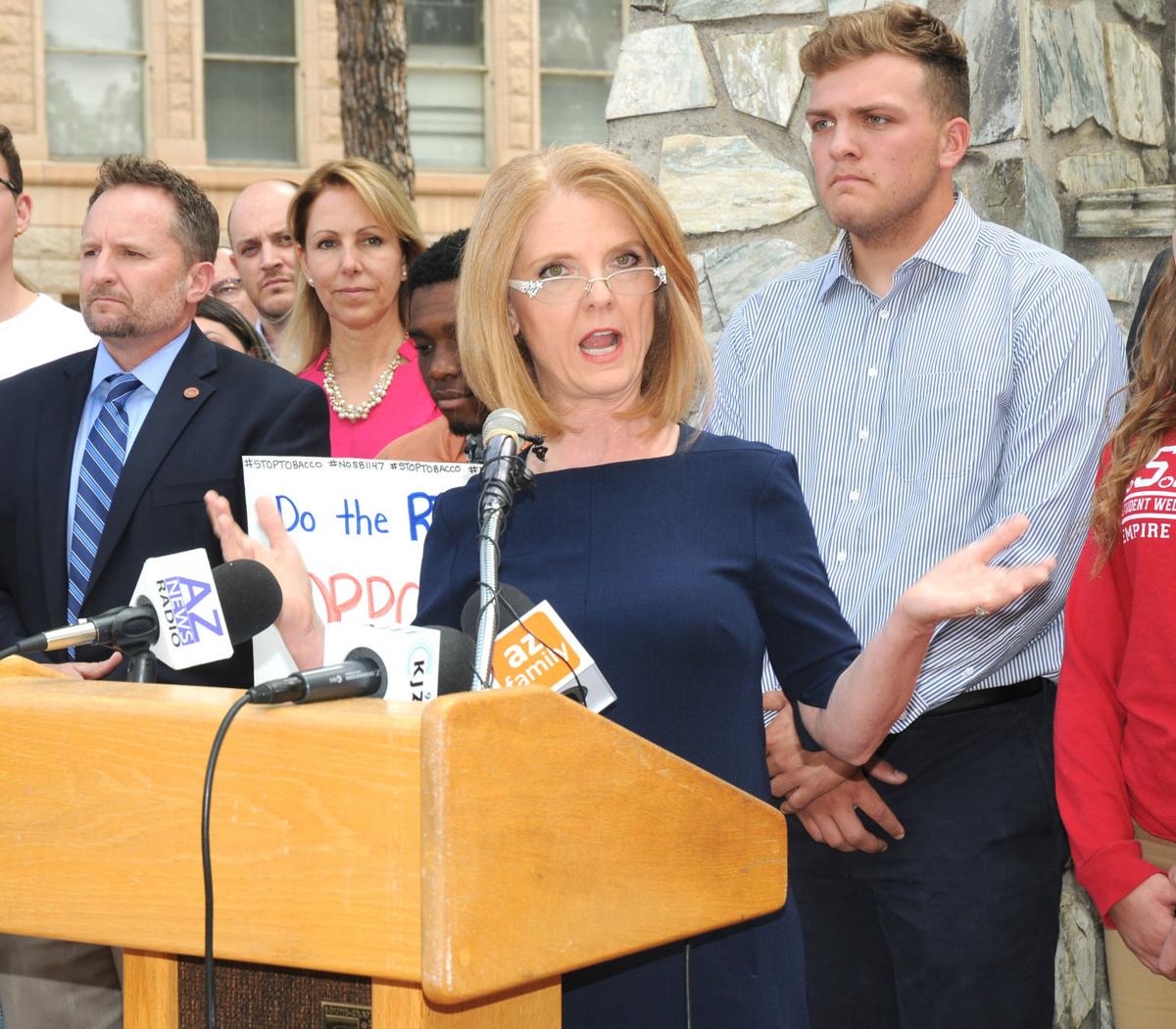PHOENIX — Some state lawmakers, educators and public health advocates are trying to derail legislation pushed by the tobacco industry and vaping retailers to block cities, towns and counties from regulating the sale of their products.
Sen. Heather Carter, R-Cave Creek, is leading the charge. She acknowledged that the bill they oppose — Senate Bill 1147 — would raise the age to buy and use tobacco products to 21 from 18. It also would cover “alternative nicotine products,” generally meaning other products with nicotine.
But the big trade-off is that the industry-backed bill, set for House debate on Tuesday, April 30, would override virtually every local regulation now in existence, ranging from how far tobacco shops have to be from schools to enhanced penalties for retailers who sell to anyone who is underage.
About the only thing that local governments could do is control tobacco and vaping use on their own properties, including any publicly funded stadiums.
The bill would also permit “reasonable zoning requirements” for the sale of tobacco and vaping products. But there is no definition of “reasonable,” leading Carter to believe that is just a lawsuit waiting to happen.
The state pre-emption of local regulations would have severe implications.
In Tucson, for example, the City Council adopted a comprehensive code in 1997 after concluding that state law “has proven ineffective in preventing tobacco sales and distribution to minors and preventing minors from buying and obtaining tobacco.”
And unlike what is in SB 1147, Tucson’s law does not simply impose fines on retailers for selling to minors.
Any Tucson shop that sells to minors at least three times within a 12-month period loses its ability to sell tobacco for 24 hours. Four offenses in the same period means a 10-day suspension. And for five sales, the shop can’t sell tobacco products for a full year.
Carter said the proof that current state laws on selling to minors don’t work is borne out by the fact that retailers fail “sting” operations conducted now by the Attorney General’s Office nearly 40 percent of the time.
Multiple cities including Mesa have ordinances dealing with “designated indoor smoking areas,” including requiring that they be “physically separated and independently ventilated from smoke-free areas.”
And in Phoenix and Tempe, there are requirements for tobacco shops to be at least 1,320 feet from schools. That, too, would disappear, essentially allowing for the sale of not just cigarettes but vaping devices and refills nearby.
People should not underestimate the deterrent of distance, said Matt Bergevin, senior class president at Marcos de Niza High School in Tempe.
“I know I wouldn’t walk 1,300 feet for a Polar Pop,” he said. “I don’t know why kids will do it for a Juul or a vape or anything that has to do with tobacco. I mean, most of my friends want to go home and play Fortnight.”
Gibson McKay, who represents the Vapor Technology Association, defending the proposal to strip the right of local communities to set their own rules.
“We do it with liquor,” he said, with state laws already pre-empting local restrictions on things like where bars can be located and how their products can be sold.
“Why wouldn’t it work with this situation?”
Pre-emption is not the only issue.
Carter is pushing House Bill 2357, which would put vaping products under the same laws that now govern tobacco. Those specifically include where people can and cannot smoke.
By contrast, SB 1147 is designed to ensure that vaping products are not placed in the same category as cigarettes, cigars and other tobacco products.
Tory Roberg, who also represents the Vapor Technology Association, said there is no need to treat vaping products — including the plastic devices that hold the liquids that are heated — the same as tobacco.
“It’s not necessary to add vapor products to the tobacco definition to keep it out of the hands of kids,” she said.
But Roberg made it clear her organization fears that a broader definition at the state level could lead to imposing the current high taxes on tobacco products on not just the nicotine-filled liquids and refills but on the vaping pens themselves.
Carter countered that nothing in her alternative legislation would alter the taxes on any products.
Roberg also denied any link to the tobacco industry.
But that industry has not exactly been hands-off in this situation, with the legislation backed by Altria, the company that makes Marlboros and Virginia Slims — and the company that also has bought a stake in Juul Labs.
“They cannot solve the problem they created,” Carter said of the industry-backed proposal.
Sen. David Farnsworth, R-Mesa, said tobacco companies, finding their products less in demand, are buying up the vaping companies.
“I am convinced that they are determined to have a new generation of addicted young people, addicted to nicotine,” he said.
SB 1147 also would reduce the penalty for those who are not of legal age who attempt to purchase tobacco.
Right now it is a petty offense, which essentially is a criminal violation. The legislation instead would provide for a fine of at least $100 and 30 hours of community restitution.
Roberg said there is no reason to make possession a crime, calling the industry-backed proposal part of an effort at “criminal justice reform.”





